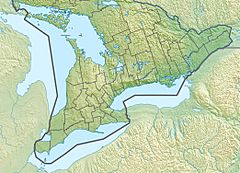Teeswater River facts for kids
Quick facts for kids Teeswater River |
|
|---|---|
|
Location of the mouth of the Teeswater River in southern Ontario
|
|
| Country | Canada |
| Province | Ontario |
| Region | Southwestern Ontario |
| County | Bruce |
| Municipalities | Arran–Elderslie, Brockton, South Bruce |
| Physical characteristics | |
| Main source | Bruce County 377 m (1,237 ft) 43°58′28″N 81°05′46″W / 43.97444°N 81.09611°W |
| River mouth | Saugeen River Arran–Elderslie 214 m (702 ft) 44°18′24″N 81°16′23″W / 44.30667°N 81.27306°W |
| Length | 75 km (47 mi) |
| Basin features | |
| River system | Great Lakes Basin |
| Basin size | 683 km2 (264 sq mi) |
The Teeswater River is a river located in Ontario, Canada. It flows through Bruce County in the region of Southwestern Ontario. This river is an important part of the Great Lakes Basin. It eventually flows into the Saugeen River near the town of Paisley, Ontario.
Contents
About the Teeswater River
The Teeswater River is an important waterway in Ontario. It flows through several areas in Bruce County. These areas include Arran–Elderslie, Brockton, and South Bruce.
Where Does It Start and End?
The Teeswater River begins its journey in Bruce County. It starts at an elevation of about 377 meters (1,237 feet) above sea level. From there, it flows for about 75 kilometers (47 miles). The river then joins the Saugeen River in Arran–Elderslie. This meeting point is at a lower elevation of about 214 meters (702 feet).
How Was the River Named?
The Teeswater River got its name from another famous river. It was named after the River Tees in England. This shows a connection to the history and origins of the people who settled in the area.
Towns Along the River
One important community is located right on the Teeswater River. The town of Teeswater is built along its banks. Rivers often play a big role in where towns are built. They provide water, transportation, and power.
River System and Basin
The Teeswater River is part of a much larger water system. It belongs to the Great Lakes Basin. This means its waters eventually flow into the Great Lakes. The area that drains into the Teeswater River is called its basin. This basin covers about 683 square kilometers (264 square miles).
 | Misty Copeland |
 | Raven Wilkinson |
 | Debra Austin |
 | Aesha Ash |


